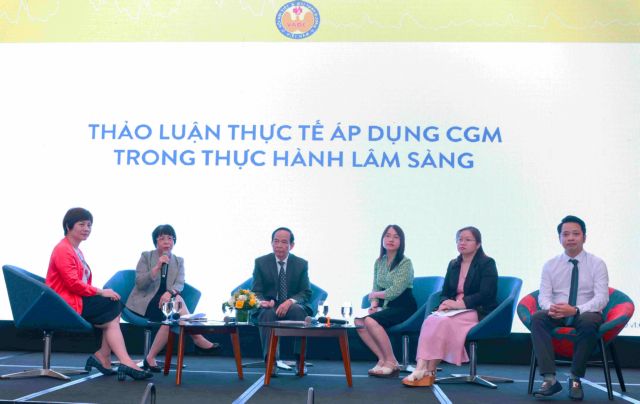 Society
Society


|
| Panelists share experiences in diabetes care and management in Việt Nam. — Photo courtesy of the Vietnam Association of Diabetes and Endocrinology |
HÀ NỘI — The Vietnam Association of Diabetes and Endocrinology has introduced the first continuous glucose monitoring protocol guideline, to advise healthcare professionals in Việt Nam.
The guideline is expected to bring about major changes to the country’s diabetes management.
The Ministry of Health had previously recommended continuous glucose monitoring (CGM) for people living with diabetes type 2 who desire to better manage their glucose levels and also for hospitalised patients with required glucose monitoring.
The first-of-its-kind guideline, issued by the Vietnam Association of Diabetes and Endocrinology (VADE) in late February 2024, provides concrete steps on how healthcare professionals (HCPs) and people with diabetes should implement CGM.
“Overall implementation of technology will not only help better manage diabetes but also reduce the treatment cost burden on people and the healthcare system. Therefore, a detailed guideline for continous glucose monitoring is of great importance,” said Prof. Dr. Trần Hữu Dàng, VADE Chairman, formerly Vice Rector of Hue University of Medicine and Pharmacy on Thursday.
CGM involves using sensors attached under the skin to measure glucose in the interstitial fluid over a period of time and display continuously estimated blood glucose values over time, the VADE guideline said.
For HCPs, the guideline lists out CGM devices and how to use them; indications and contraindications; key indicators, especially those of the elderly and pregnant women as well as data analysis.
For people with diabetes, the guideline provides general introduction of CGM, the operation of CGM and how to use monitoring devices.
Based on these guidelines, HCPs will establish protocols for CGM implementation for hospitals nationwide, especially those in Hà Nội and HCM City.
The number of people living with diabetes in Việt Nam has been on the rise, with the disease prevalence doubling over the past ten years. Among those, more than half of them are not diagnosed, therefore not being treated. For those under treatment, only a third achieved diabetes treatment goal, according to Prof. Dàng.
“Keeping blood glucose level stable and within acceptable range is key for people living with diabetes to prevent diabetic complications,” Dàng said.
“CGM provides a real-time glucose reading and a detailed picture of a person's glucose levels, helping doctors understand the patient’s conditions to make more personalised treatment decision and improve treatment outcomes.
“The technology also helps people living with diabetes better manage their diabetes and improve quality of life through actionable insights that enable lifestyle adjustments.”
One of the CGM devices listed in the VADE guideline is FreeStyle Libre, the flash glucose monitoring technology which was launched in March 2021 for adults and children (aged four and above) in Việt Nam by Abbott.
The FreeStyle Libre system, launched in Việt Nam in March 2021, helps monitor glucose levels every minute through a small, coin-sized sensor worn on the back of the upper arm for up to 14 days – making it the longest-lasting flash glucose monitoring device available globally. The technology has revolutionised the way diabetes is managed for about six million people across more than 60 countries. — VNS




